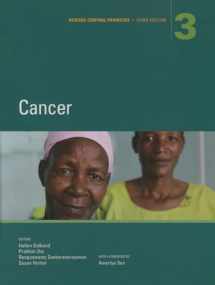
Disease Control Priorities: Cancer (Disease Control Priorities, 3)
Book details
Summary
Description
Volume 2, Cancer, presents the complex patterns of cancer incidence and death around the world and evidence on effective and cost-effective ways to control cancers. The DCP3 evaluation of cancer will indicate where cancer treatment is ineffective and wasteful, and offer alternative cancer care packages that are cost-effective and suited to low-resource settings. Main messages from the volume include:* Quality matters in all aspects of cancer treatment and palliation.* Cancer registries that track incidence, mortality, and survival - paired with systems to capture causes of death are important to understanding the national cancer burden and the effect of interventions over time.* Effective interventions exist at a range of prices. Adopting "resourceappropriate" measures which allow the most effective treatment for the greatest number of people will be advantageous to countries.* Prioritizing resources toward early stage and curable cancers is likely to have the greatest health impact in low income settings.* Research prioritization is no longer just a global responsibility.Providing cancer treatment requires adequate numbers of trained healthcare professionals and infrastructure beyond what is available in most LMICs, especially lowincome countries. Careful patient monitoring is a requirement of good quality cancer care and this often involves laboratory tests in addition to clinical examination. Even if financing were immediately available to build or expand a cancer control system, reaching capacity will take many years.


We would LOVE it if you could help us and other readers by reviewing the book
Book review



